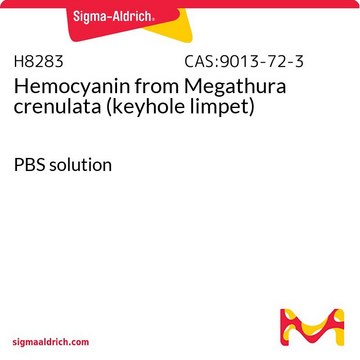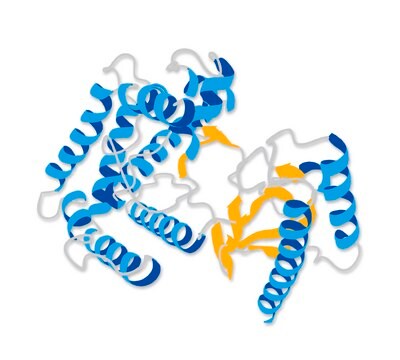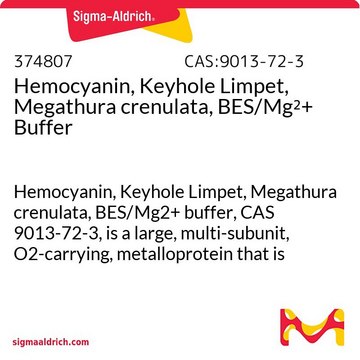B8556
Hemocyanin from mollusk
buffered aqueous solution
Synonyme(s) :
Blue Carrier®
Se connecterpour consulter vos tarifs contractuels et ceux de votre entreprise/organisme
About This Item
Produits recommandés
Source biologique
Concholepas sp. (Concholepas concholepas )
Niveau de qualité
Forme
buffered aqueous solution
Technique(s)
bioconjugation: suitable
Température de stockage
2-8°C
Vous recherchez des produits similaires ? Visite Guide de comparaison des produits
Application
Blue Carrier is an oxygen-carrying protein isolated from the hemolymph of the mollusk Concholepas concholepas. It is highly immunogenic, useful as a carrier protein for the production of antibodies to small molecules. An example of the protocol is given in reference to production of antibodies to gizzerosine.
Hemocyanin is a carrier protein used in antibody production. It has been used to promote antibody production against haptins and peptides, in therepy for bladder carcinoma, and has a component in vaccines for cancer.
Actions biochimiques/physiologiques
Highly soluble carrier protein used in antibody production
Forme physique
100 mg in 0.5 mL of 0.15 M NaCl, 0.1 M sodium phosphate, pH 7.2
Informations légales
Blue Carrier is a registered trademark of Biosonda S.A.
Code de la classe de stockage
10 - Combustible liquids
Classe de danger pour l'eau (WGK)
WGK 3
Point d'éclair (°F)
Not applicable
Point d'éclair (°C)
Not applicable
Équipement de protection individuelle
Eyeshields, Gloves, multi-purpose combination respirator cartridge (US)
Faites votre choix parmi les versions les plus récentes :
Déjà en possession de ce produit ?
Retrouvez la documentation relative aux produits que vous avez récemment achetés dans la Bibliothèque de documents.
Harold Oliva et al.
Hybridoma and hybridomics, 21(5), 365-374 (2002-12-10)
We studied the reactivity of mouse monoclonal antibodies (MAbs) against the hemocyanin from the Chilean marine gastropod Concholepas concholepas (CCH). This protein has been successfully used as a carrier to produce antibodies to haptens and peptides. All MAbs (13) belonging
M I Becker et al.
Hybridoma, 17(4), 373-381 (1998-10-28)
This study is the first report of the development of monoclonal antibodies (MAbs) against gizzerosine (GZ), one of the causative agents of black vomit, a serious poultry disease. Balb/c mice were immunized with different GZ conjugates; the most immunogenic conjugate
Bruno Moltedo et al.
The Journal of urology, 176(6 Pt 1), 2690-2695 (2006-11-07)
We determined the antitumor properties of a newly available hemocyanin obtained from the Chilean gastropod Concholepas concholepas (Biosonda Corp., Santiago, Chile) in a syngeneic heterotopic mouse bladder carcinoma model. Since keyhole limpet hemocyanin (Pierce, Rockford, Illinois) is used increasingly in
Enhanced structural stability of Concholepas hemocyanin increases its immunogenicity and maintains its non-specific immunostimulatory effects.
Arancibia S., et al.
European Journal of Immunology (2011)
Anaphylaxis caused by hemocyanin contained in shrimp cephalothorax.
Daiana Guillen et al.
Annals of allergy, asthma & immunology : official publication of the American College of Allergy, Asthma, & Immunology, 113(6), 674-675 (2014-10-14)
Notre équipe de scientifiques dispose d'une expérience dans tous les secteurs de la recherche, notamment en sciences de la vie, science des matériaux, synthèse chimique, chromatographie, analyse et dans de nombreux autres domaines..
Contacter notre Service technique








